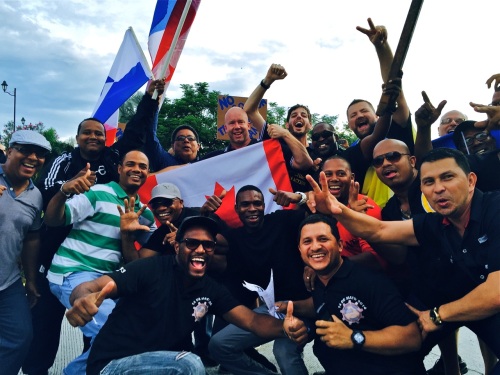We’re back — and we’re on fire.
Every couple of years, ITF inspectors from around the globe gather for the Worldwide Inspectors Seminar, where we sharpen our skills and catch up on ITF policies and programs. Often the location for the seminar is strategically chosen — and this year, Panama fit the criteria perfectly.
It was the ideal place to meet: the newly expanded Panama Canal is nearing completion, plans for a major container hub port are under way, the country is increasingly relevant in the world of international capital — and it’s home to the largest flag-of-convenience on offer to the world of shipping.
For inspectors, there was one other joy in the choice of Panama. We climb gangways daily with the sole aim of establishing and defending just, safe and decent maritime workplaces. Our job is to get stuck into fights with shipowners to protect the rights of seafarers and dockers. As we headed for our training session, we knew that the Panama Canal workers, who have no right to strike, had been without a valid collective agreement for a long time — and that they faced massive safety issues on the job.
So it wasn’t just a training seminar we were heading for. It was an exercise in solidarity. And sometimes, when it comes to maritime workers and critical chokepoints for shipping, solidarity really makes a difference.
The video above is a short clip of a rally held by the coalition of the Panama Canal’s maritime unions during our visit this month. (There’s more video footage at the end of this post.) We were invited to take part in supporting our comrades on the canal. The protest was big, loud, lively and heartfelt. And it got Panama’s attention. As the march drew to a close at the presidential palace, the Vice Minister of the Presidency and the Vice Minister of Labour asked to meet representatives of the coalition. Jacqueline Smith, the ITF’s Maritime Coordinator, and Ivan de la Gaurdia, General Secretary of the Union de Capitanes y Oficiales de Cubierta, met with them in the palace for more than two hours.
We took to the streets in a show of solidarity — not only with the Panamanian workers, but also in support of the specific and critical safety issues they have raised. They are concerned, for example, about the fleet of canal tugs (which guide the massive ships into place during transit) that is only marginally maintained and has several serious design flaws. Beyond that, the Panama Canal Administration refuses to provide training in connection with the canal’s new expansion – leaving workers to travel outside the country at union expense for training on how to tackle their newly configured work.
Equally important, workers say there are trade-union and human rights at stake.
As canal workers put it, “the governments and corporations are not going to stop trying to squeeze our necks until we drop dead from exhaustion and concern. Things get worse by the day in this country. We need to stick together or we will soon be boarding a shuttle straight to middle-age feudalism.
“The canal is no more than a sugar cane or tobacco plantation, [canal authority CEO Jorge Quijano] being the owner, and management the usual foremen.”
De la Guardia notes Quijano “hates when we say that,” but argues that the real solution is to deal with the issues workers have raised.
They have been herded into “a legal bubble in which only the canal regulations and only a chapter of the state’s constitution apply,” de la Guardia says. “They are a country within a country, another Vatican — but without the clergy and the Pope. I am telling you, this is becoming more and more a time bomb.”
We share de la Guardia’s outrage. Panama may be allowed to operate a flag-of-convenience registry that gives no voice to worker’s rights. But Panamanians should not live in a flag-of-convenience republic; workers there must be allowed the right to organize and to free collective bargaining. Canadian inspectors, like the 150 of our brothers and sisters around the world, stand shoulder-to-shoulder with the canal workers in this fight. We will remain at their sides until the struggle is won.
Before we close, we must also express great pride in Canadian inspectors Vince Giannopoulos, Karl Risser and Gerard Bradbury, and Gerard’s partner Kelly, who all played a prominent role in the demonstration. For his part, Canadian coordinator Peter Lahay led the crowd in memorable version of the famous Bob Crow call-and-response chant of “they don’t like us, we don’t care.”
Panamanian workers felt the love. In a letter of thanks on their behalf, de la Guardia wrote: “The rally was a landmark event and will be forever in our memories. To see you guys jumping, cheering and rallying with us was a positively significant event, solidarity in its truest form … We were ecstatic looking at you and seeing the levels of commitment, organization, heart, brotherhood and solidarity displayed by all of you. You risked all to rally with us since this is, after all, a foreign country for all of you and you did not know what to expect. Remarkable and inspiring, if you ask me.”
Next up: A brief look at the seminar itself.

Canada’s Vince Giannopoulos and Karl Risser (top centre, with flag) whip up a frenzy of solidarity at the Panama Canal rally Oct. 15, 2015.



